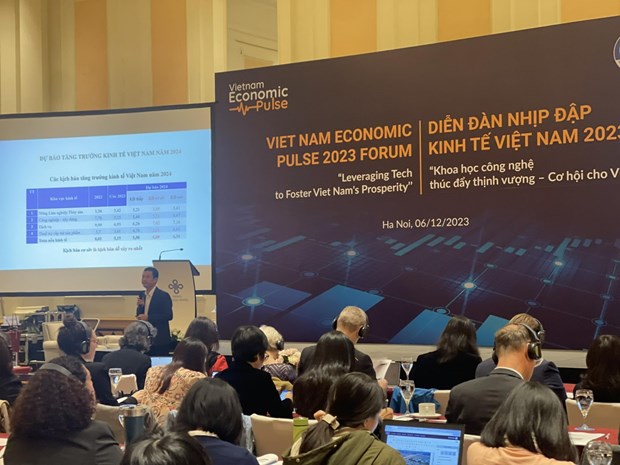Vietnam to post faster growth over other countries in 2023: CIEM
Vietnam may record a GDP growth rate of 5.19% in 2023, lower than the 8.02% expansion last year but still higher than many other countries in the region and the world, the Central Institute for Economic Management (CIEM) predicted.
 At the Vietnam Economic Pulse forum held in Hanoi on December 6
At the Vietnam Economic Pulse forum held in Hanoi on December 6
Economic growth this year is forecast to show quarter-on-quarter improvement with the rate in the fourth quarter estimated at 7.72%, higher than 5.23% in Q3, 4.05% in Q2, and 3.28% in Q1, Dr. Nguyen Huu Tho, a representative of the CIEM research team told the Vietnam Economic Pulse forum held in Hanoi on December 6.
Meanwhile, 461 trillion VND (almost 19 billion USD) in public investment was disbursed during the first 11 months, 6.7% and 122.6 trillion VND higher than the disbursed during the same period of 2022.
Of the about 28.8 billion USD in foreign direct investment (FDI) registered during the period, 20.2 billion USD was implemented, the highest over the last five years. Vietnam has also delivered on proper control of inflation, he said.
Despite the positive results, researchers also pointed out certain problems affecting economic growth this year, including those related to the corporate bond market, the real estate market, and foreign trade.
Though economic growth is high – estimated at 5.19%, it still failed to meet the target of 6.5%, which may impact the development roadmap to 2030, they noted.
Apart from external factors like the complex geo-political situation in the world, global economic contraction and inflation, the Vietnamese economy has also been affected by internal factors such as problems in institutional building, overlapping legal regulations, and the slow reduction of business conditions and administrative procedures.
CIEM Director Tran Hong Minh said the country will have to make strong efforts to surmount internal and external economic headwinds. To secure breakthroughs in 2024 and beyond, appropriate economic policies and strategies are required to capitalise on achievements of the Fourth Industrial Revolution to overcome new difficulties and challenges.
UNDP Resident Representative in Vietnam Ramla Khalidi perceived that to recover strongly in 2024, Vietnam needs to take flexible solutions to current difficulties and challenges. In fact, innovation and energy transition processes are bringing about new opportunities for it to enter new markets, increase goods value, and promote export.
The country can also step up attracting investment and make use of advanced technology such as semiconductor and artificial intelligence technologies to seize these opportunities so as to secure higher-level development and escape from the middle-income trap, she suggested./.
VNA

